I met Kate Hanley years ago at a salon in the home of our friend Deb Walsh. Kate is always writing interesting books and articles and when she wrote How to Be a Better Person, I interviewed her for the how to write a book website about her book writing and publishing journey.
Since then, Kate has done an excellent job of continuing to engage readers and draw new readers with her excellent 10 minute podcast (700 episodes!), articles, speaking, social media and other endeavors. In today’s interview, Kate shares her secrets for long-term book sales and relevancy, as well as tips for podcasting.
Lisa: Kate, I love the book How to Be a Better Person and was fortunate to be an early reader and interviewer. It’s well researched and gives readers small ways to shift. It feels more like an invitation and less like a to-do list than many self help books. I assume that was intentional. What was your vision when you started and what inspired you?
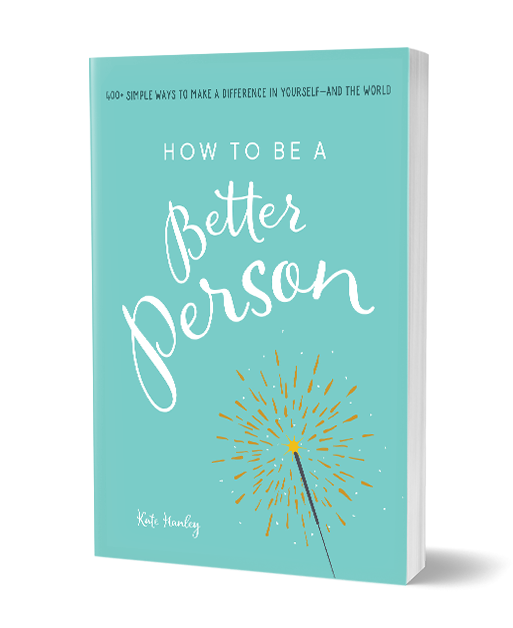
Inspiration to Write a Book
Kate: I was inspired by a poll that came out in December 2016 from Marist University that said, for the first time ever, the most popular New Year’s resolution was to be a better person. This was right after the election, when we felt so divided, and this poll gave me hope that people were realizing we can’t just get stuck in our own little worlds, that we need to be the change we wish to see. I wanted to be part of that effort, and help folks figure out a way to make that very important and very amorphous desire real.
How you keep readers & book buyers interested over the long run.
Lisa: Some authors put all their energy in at the book launch and then give up. You are masterful at the long run — keeping the book in the news, as something that continues to be recommended. Of course, some of that is writing an engaging and uplifting book that’s useful to people, but there’s more to it. Can you talk about how you keep readers and book buyers interested over the long run? And also, did you do that with all your books or is this something you learned over time?
Kate: Well gosh, thank you! It doesn’t necessarily feel masterful, ha. I decided to turn my book into a podcast primarily because I wanted a way to help the book stay fresh. As you know, the sad truth is that a book only feels new and exciting for about six weeks. But a podcast—especially one that comes out every day—renews itself every time you publish an episode. Also, this particular book had 401 ideas in it. That is a big number! I figured I could easily commit to doing a year and a half of 20 episodes a month and not run out of ideas, and that I would reassess after that milestone had come and gone. Now I’m a two and a half years in, and I’m really hooked by the medium.
Lisa: Congratulations! That’s a lot of episodes – and they are really high quality, well thought out and inspiring.
Podcasts: One of the Most Effective Ways to Reach Readers.
Kate: Having the podcast helps me get interviews, such as this one, and even a couple weeks ago I was on a news program in NYC. I don’t think that would have happened with a four-year-old book.
I did not do anything remotely this extended or extensive for my other books. Those were more of your typical three month push.
Lisa: What do you find are the easiest and the most effective ways to reach readers right now with a book?
Kate: I think that getting booked on podcasts is a great way to do this. Podcasts are booming and they need folks to interview. That being said, they are also receiving a lot of generic pitches about all of the “things I could talk about.” It does take a targeted, compelling, personalized pitch to capture the eye of a podcast host, or if you’ve taken the time to build a relationship with someone that, of course, helps too.
Writing that thoughtful pitch or developing a relationship takes time and effort, but the interviews themselves can be done from home and you don’t have to do your hair.
Lisa: I love that too!
What about Instagram?
Kate: You can also reach out to people to ask them to host you on their Instagram account. I haven’t done these yet, but I also think that Instagram reels and TikTok videos are a great way to capture people’s attention and deliver little nuggets of your message.
Lisa: Yes, I recently spoke to Paige Velasquez of Zilker Media and she said they were seeing a lot of successful book promotion through Instagram and Tik Tok outreach. So, it’s on my radar for the future, too!
Let’s talk about your wonderful podcast.
Lisa: Wow! A daily podcast. Granted, they’re fairly short episodes, often under 10 minutes, but that’s a big commitment. How do you do it? And how do you come up with new ideas both for the weekly theme and for each day, so you can podcast every single day?
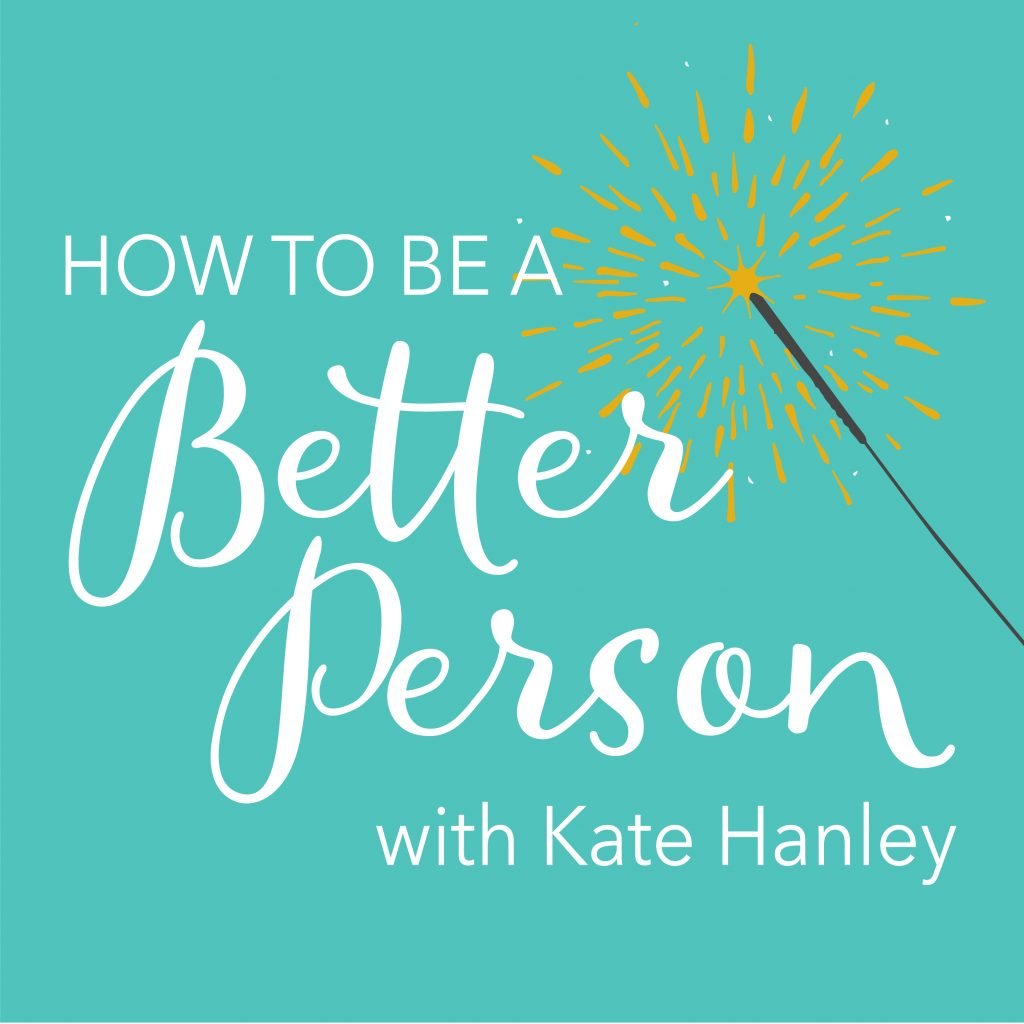
Kate: Coming up with the weekly theme is almost harder than coming up with each individual episode. Once I have a compelling hook, I find it’s pretty easy to think of four different things to say about that.
I write a week’s worth of episodes at a time and record them all at once. All told, it takes about a full day a week. I take one or two weeks off each quarter—the benefit of having so many episodes is that there are plenty to choose from to re-broadcast.
Personally, I think that having to produce 5 episodes a week is what actually ensures that I do them, because I can’t overthink, I just have to get writing. Having a daily podcast will definitely teach you how to go with good enough. It’s a lesson that’s really good for me.
Also, as a podcast listener, I don’t have 45 minute or one hour chunks of time to listen to an episode. But 10 minutes or less—that I can handle. I like that short daily episodes were something that fit into my life—and I figured I’m not alone in this, and others would appreciate that too. And I liked the novelty of it. Yes, I was launching a podcast like so many other people are, but I’m putting my spin on it. That gave me confidence to wade into a crowded sea.
How a podcast can support book sales over time
Lisa: Your podcast is inspired by the book How to Be a Better Person. Can you speak about the initial inspiration for the podcast and also how it’s supported book sales over time?
Kate: I wanted to keep the book fresh and top of mind—both for readers and for people who might want to interview me. Plus, I have loved audio ever since I had a radio show in college. (My show was called “The Greatest Hits of the 20s, 30s, 40s, 50s, 60s, 70s, and 80s” – even then I had a love of broad topics!) Being in the booth, with the headphones and all the dials. And the cough button!! That you could press if you had to cough so no one could hear you. And to know that you were in people’s ears as they went about their lives was also strangely intimate. I loved it.
As for book sales, all I can say is that over the last two years, How to Be a Better Person has sold about 2.5 times more copies than my book Stress Less, which came out less than a year prior to HTBABP. The royalties aren’t going to send my kids to college, but they add a (very) low four figures to my bottom line each year.
What Makes a Good Podcaster?
Lisa: What makes a good podcaster and what should authors know if they are considering starting a podcast?
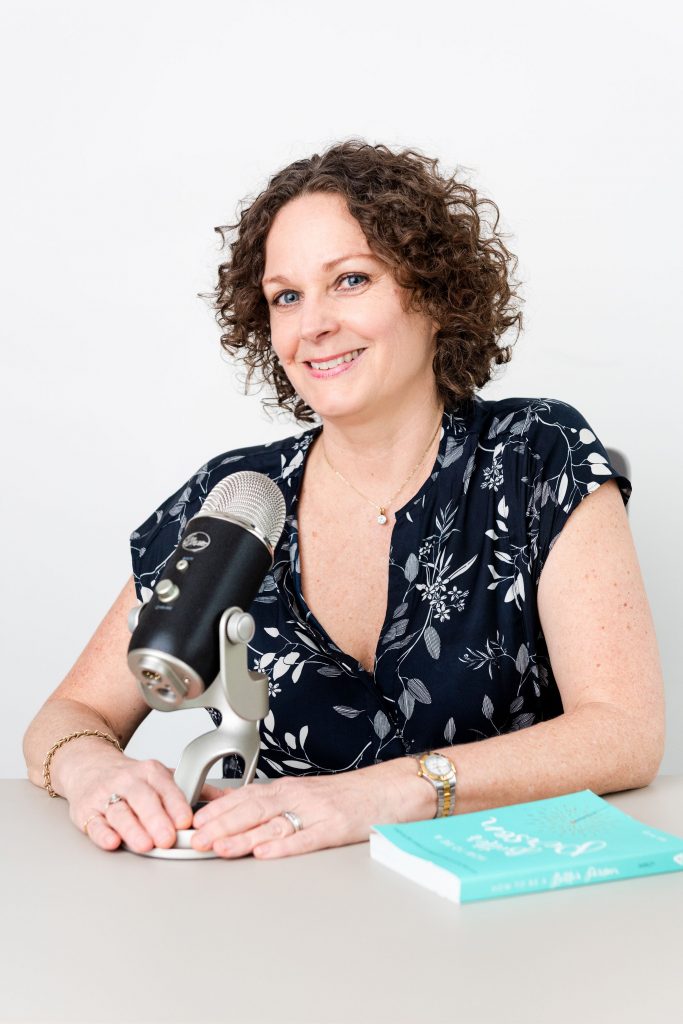
Authors should know that podcasting is a great way to keep your book fresh, to help you build an audience of fans, to help you network, and a lot easier than it seems (especially when you pay someone to edit it for you – hey, you need business expenses!). The podcasting community is also wonderful, and you can hook up with it on Twitter.
That being said, it’s like starting another business. Maybe not a full-time business, but a business nonetheless. One that isn’t going to put a ton of money directly in your pocket unless you come up with an offering that you want to market to your listeners (a class, a self-published book, coaching, something like that). Just know that it’s not as simple as build it and they will come. It really helps to love it.
Lisa: Podcasting seems like a lot of work. What’s involved and how do you make it do-able and not take over your life? Do you need to know a lot of tech?
Kate: For me what’s involved is planning episode themes (sometimes I’m ahead of the game, sometimes it’s very last minute, depending on what else is going on in my work and life), writing episodes (I turn them into blog posts for my website and that way I never have to panic that if I mess up the recording somehow it’s lost forever), reaching out to potential guests (I very rarely have someone on because they pitched me; I prefer to tap my network because it helps me strengthen connections with folks I know, or to meet people who are two degrees of separation from me; occasionally I reach out to someone ‘big’ whom I don’t have a a connection to, but it’s rare that those folks end up coming on), recording interviews, recording my solo episodes, and writing show notes.
And now I have the ‘good problem’ of coordinating with sponsors—trying their products, writing spots, doing the admin around that of scheduling and invoicing. It is a lot of work. Like I said, it really helps to love it!
I don’t know a lot of tech; a friend introduced me to her friend who, along with her husband, run a podcast editing and tech support service. I just need to know how to plug in my microphone, open up Audacity (the free software I use to record) or Squadcast (the web-based platform I use to record interviews), and hit record. Then I just export it to Dropbox and send my editors a link and my show notes. They take care of the rest.
Promoting your Podcast
Lisa: How do you promote your podcast?
Kate: I post on my social media channels and send a weekly newsletter out to my list with that week’s episodes. I was doing some Google and Facebook ad spending but quickly realized it wasn’t worth it. To me that money is better spent paying someone to help me post on social media regularly, because I am very erratic with it when left to my own devices.
Lisa: What advice do you have for authors about starting a podcast?
Kate: Don’t do it just because you think it will sound good to publishers!
Favorite Podcast Episodes
Lisa: This may be a tough question but what was your favorite podcast episode and why?
Kate: Wow, that is very hard question, particularly because I have close to 700 episodes at this point!! Recently I very much enjoyed my interview with Dr. Stephen Snyder, NYC sex therapist and author of Love Worth Making. I was asking him about how to take care of your sex life in a long-term relationship, and he gave very practical advice and was also super empathetic and funny. I learned a lot. I also LOVED your interview, Lisa, when you talked me through your Meet Your Muse exercise. Turns out my muse is an elderly gnome who lives in a tree and makes great cookies! I loved meeting her, I found it inspiring but also energizing.
Lisa: I was delighted to get to know your muse during that exercise — from what you conveyed to me, your gnome muse is absolutely delightful, charming and such a sense of humor!
A Book can Open Doors
Lisa: You mentioned to me that How to be a Better Person has opened many doors and supported additional revenue streams. Will you elaborate for our readers?
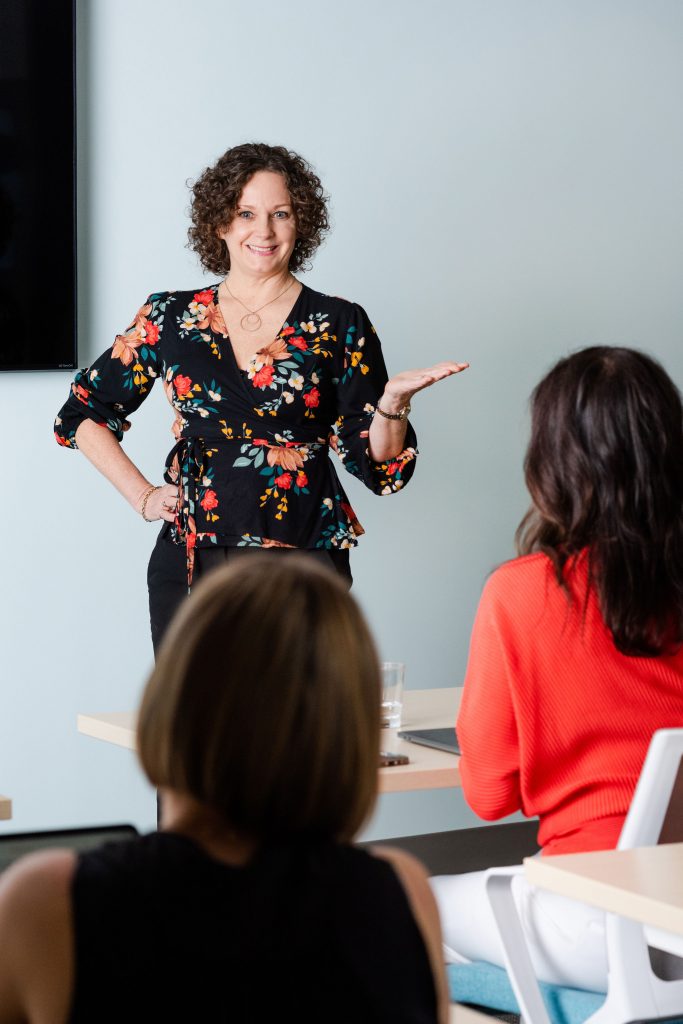
Speaking Opportunities
Kate: Even though my book is now over 4 years old, in the last month I’ve been invited to speak to a community of women at WhtNow?, a new community for women at midlife, and been interviewed on WPIX news in New York City. Neither of these would have happened without my podcast.
Podcast Sponsors
Kate: I am also getting sponsors on my podcast, which, while not a life-changing revenue stream, is a nice addition to my bottom line. And I will soon start marketing online classes and real-time gatherings for my listeners, which I will charge for.
Lisa: Congratulations! That’s fantastic. And it shows that a book doesn’t need to be “just out” to continue to have an impact on readers and grow your community (and brand). What advice do you have for authors about using the book to support a business (such as courses) and leveraging the business to support book sales—reaching more readers and expanding your impact?
What Doors do you Want Your Book to Open?
Kate: I believe you have to go into writing a book thinking this way—what doors do you want it to open, and what other parts of your business will it either further or make possible? Writing the book itself is not likely to be a big money maker (for some it is, but for most it’s really not). You’ve got to think about how you’re going to use it. And, if you already have a service-based business and are speaking or teaching, if you don’t have a book, you’re leaving money on the table (because people who’ve heard you speak will be your most rabid book buyers). Having that book will also elevate the business opportunities that come your way.
Lisa: You’ve spent years exploring how to be a better person. Is there one piece of advice that comes to mind as the absolute key to being a better person (or 2 or 3 if it’s hard to choose one)?
Kate: One thing that helps across the board is to respond instead of react. Generally our knee jerk reactions tend to be out of anger or fear or other negative emotions. If you can remember to pause—even long enough to take one breath—it will invite the wiser part of yourself to lead the way.
What You Can Learn About Writing from Reading Fiction
Lisa: I especially loved the episode 5 Books That Helped Me Become a Better Person in 2021. EP: 633. You start, perhaps surprisingly, with a novel, and make that point of how novels teach us empathy. I love fiction. Two of the books are novels. As a nonfiction author, what have you learned about writing from reading fiction?
Kate: I think reading absolutely anything can help your writing—catalog copy, poetry, even things that you don’t consume in written form, like plays, podcast, and even television shows or movies. When you notice what you love; the things that land for you; the bits that stand out, you are training your inner ear to create in a way that delivers a similar impact. Reading fiction for me is a lesson in imagining a detailed inner world for someone else. In fiction that someone else is a character. When I’m writing non-fiction, I’m seeking to inhabit the inner life of my readers
Lisa: A great insight! Thank you for spending time with us. And I encourage our readers to check out your podcast – most episodes are less than 10 minutes (though ours went a bit over!).
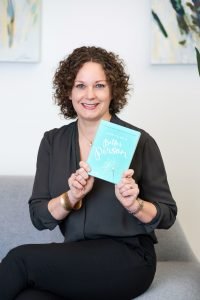
About Kate Hanley
Kate Hanley is the author of How to Be a Better Person and the host of the How to Be a Better Person podcast—a daily podcast designed to be the angel on your shoulder helping you follow your better instincts. Kate works one-on-one with clients as a personal development coach (and offers a free Decision-Making Matrix on her website to help you make decisions from the heart). She also helps people write their books, whether as a full-on ghostwriter or as a thought partner and developmental editor. Kate lives in Providence, Rhode Island, with her family and a rescue dog named Cookie.


